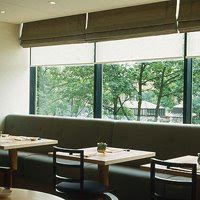
Apart from my obvious interest in food, art is my other passion, I enjoy discovering different types of art movements, reading about the meaning behind a piece of crap (and then realise maybe it is not as crappy as I first thought). But not until I was old enough to join the two together by appreciate food as art and chefs as artists, mainly being influenced by TV programmes such as Great British Menu which show the skills and dedication of some of the best chefs in the world in creating some heavenly-looking dishes..
For a long time I was determined that food is in fact art, and would argue to death with anyone who disagrees with me. Why isn't food art? Before the Mona Lisa became THE 'Mona Lisa' it was merely oil paint in their primary colours; before Coq au Vin became Coq au Vin it was only rooster and wine but both products become such pleasure to our senses after the artist or chef worked their magic. The topic of food as an art form interests me so much I decided to make it the title of my dissertation, it is when I started doing research for it I started realise it is much more complicated than I thought to define 'art'.
Some say art is a combination of skill and imagination, therefore food would definitely be qualified as art as it consists both. But then art can be differentiated into different parts, such as 'craft', 'fine art', 'pure art' and 'applied art'. Fine art and pure art have no use apart for one's aesthetic desires; however, a designer cannot design an applied-art form without having a function in mind. Applied art forms such as fashion, architecture and interior designs already have their own functions same as food has its own nutritional values, and the artistic value is only added afterwards; and fine art cannot be pure art if there is a function within the product itself. Food can only satisfy the aesthetic senses, it doesn't provide the same emotional satisfaction you would achieve by listening to a meaningful piece of music.
So food is not a form of fine art, but then what is? there are more so called 'art' exists that required much less to none skills or imagination at all., obviously art is a very subjective and opinions varies from person to person, but just because someone gives a the label of 'art' to a product does not make it more artistic than a plate of gourmet food. At times it really makes my blood boils to see some meaningless piece of so-called 'art' being sold for millions of pounds, like Mark Rothko's art, i tried so hard to get into his mind with all the literature about it, and went back to view his paintings again and again, but i still think its shite.
For a long time I was determined that food is in fact art, and would argue to death with anyone who disagrees with me. Why isn't food art? Before the Mona Lisa became THE 'Mona Lisa' it was merely oil paint in their primary colours; before Coq au Vin became Coq au Vin it was only rooster and wine but both products become such pleasure to our senses after the artist or chef worked their magic. The topic of food as an art form interests me so much I decided to make it the title of my dissertation, it is when I started doing research for it I started realise it is much more complicated than I thought to define 'art'.
Some say art is a combination of skill and imagination, therefore food would definitely be qualified as art as it consists both. But then art can be differentiated into different parts, such as 'craft', 'fine art', 'pure art' and 'applied art'. Fine art and pure art have no use apart for one's aesthetic desires; however, a designer cannot design an applied-art form without having a function in mind. Applied art forms such as fashion, architecture and interior designs already have their own functions same as food has its own nutritional values, and the artistic value is only added afterwards; and fine art cannot be pure art if there is a function within the product itself. Food can only satisfy the aesthetic senses, it doesn't provide the same emotional satisfaction you would achieve by listening to a meaningful piece of music.
So food is not a form of fine art, but then what is? there are more so called 'art' exists that required much less to none skills or imagination at all., obviously art is a very subjective and opinions varies from person to person, but just because someone gives a the label of 'art' to a product does not make it more artistic than a plate of gourmet food. At times it really makes my blood boils to see some meaningless piece of so-called 'art' being sold for millions of pounds, like Mark Rothko's art, i tried so hard to get into his mind with all the literature about it, and went back to view his paintings again and again, but i still think its shite.
Then again, maybe its me who doesnt know how to appreciate such things, i guess it depends how one percieves things. I still think I am right though:p/




